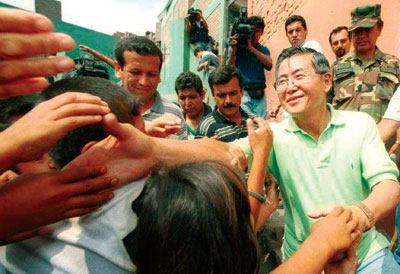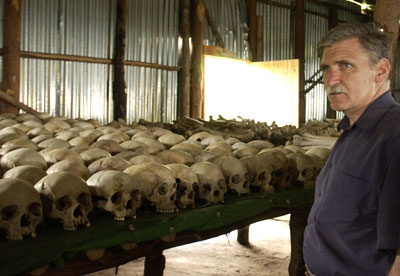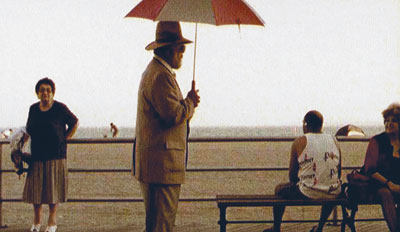DANCE CLASS
CONTENTS: PAGE 1 | PAGE 2 | PAGE 3 | PAGE 4 | PAGE 5 | PAGE 6
 |
| The Fall of Fujimori |
ELLEN PERRY
(writer-director, The Fall of Fujimori):
The first question everyone asks is, “How did you get Fujimori to talk?” After all, he had been tight-lipped since his stunning self-exile in 2000. Although I can’t speak for him entirely, my guess is that when we finally met in Tokyo, he saw that I wasn’t there to do a hit piece. I think he appreciated the fact that I didn’t represent any large media organization, that my crew was completely independent. I told him, “You have an amazing story, and I am going to tell it honestly, objectively, and in a way that is unique.” He gave me his little charming half-smile, sat back in the chair, and began to talk. I had gained his trust.
When I started this project four years ago, I never dreamed that documentaries would become as popular as they are today. Why are people flocking to see docs?
I think they want a great story and, more importantly, they want the truth. And this thirst for truth tells me that we’re standing on the edge of a new era of great American cinema. One that recalls the legendary ’70s, driven by icons like Coppola, Scorsese and Altman, whose films were meditations on the cultural turmoil of the times: Viet Nam,Watergate, the assassinations of Bobby Kennedy and Martin Luther King. Contemporaries like John Schlesinger and William Friedkin crafted narrative pieces that echoed their roots in documentary film.
Today, the U.S. is also sharply divided politically and culturally. The rhetoric has become inflammatory. But amidst all the turmoil, there may be a silver lining. People are beginning to wake up and think. There is palpable unease about the war in Iraq, threats to our civil liberties, and the growing economic disparity between rich and poor. These are controversial, profoundly important issues. And Ifeel inspired, if not obligated, to make films that address these realities, which are sometimes harsh, sometimes sad, sometimes beautiful, sometimes everything all at once.
KYLE HENRY
(writer-director, Room):
Again and again during the making of Room I learned how tired, misinformed and useless the notion of “independence” is to American cinema. I am if anything dependent as a director upon the incredible wealth of creative energy of everyone involved in a production, from craft service and production assistants to notes from producers. During good production days, I was a fully present bullshit detector for performers and a gatherer of specimens for my editor to dissect in post. At all stages, I was co-dependently joined with cast and crew who were as committed to realizing the maximum potential of Room as I was. Directors, like performers in Hollywood cinema, are the commodity fetish objects of American independent cinema, but we are at best activators for the creative energy of those around us. In the roller coaster ride of low-budget filmmaking, these cast and crew are the ones who create the film at every step of the way. They are the communal, interdependent force we simply guide and shape, picking and choosing those elements that align at a particular moment with our interests. So stand out of the way of your vision and actually see what you are given at any one moment to know the true potential of the forces that have been unleashed! Then, make your choices, and live with them.
ANDREW WALKER
(writer-director, The Talent Given Us):
With 20 years into this leap of faith tethered only to the poverty line and otherwise known as being an independent filmmaker, I suppose it is a perk of sorts that I have acquired a trust in myself. It must have been this aspect that persuaded me to make a film starring my mother and father, non-actors both. But I have needed all these 20 years and the making of my film, The Talent Given Us, to learn to trust in energies beyond the self-reliant impulse that drove me to be a filmmaker in the first place. I’m not the least bit religious, so this is not a holy claim meant to imply that a god asserts itself through the filmmaker, but it is rooted in a spiritual concept that the filmmaker is not the god of his or her film; the author, perhaps, but not the god. Making The Talent Given Us revealed the difference to me — that film directing is in equal measures an act of reception and an act of conduction, that a director’s signature is shaped not only by what you control but by what you allow to happen, and that to balance these tendencies, a director must be, first among many other things, tenderly open, concerned less with the answers you possess than the questions you ask.
I made The Talent Given Us for 30 g’s and with a two-man crew, including myself as cinematographer. These intense limitations forced me to concentrate on the heart of the story, its characters — my mother, father, and two sisters playing themselves in a scripted narrative that borrows faithfully from emotional and historical truth. In doing so I was greatly aided by 40 years of rehearsal with the cast and a deep respect for what John Cassavetes called “small moments.” After the initial days of shooting, my father, for example, was unbothered by my ubiquitous camera and the film nakedly captures the heartbreaking quirks that afflict his body and soul. As in the scene where he falls asleep in mid-recall of his mother’s indifference, the film benefits from a number of “lightning in a bottle” moments that resulted from the immediacy of our process. Because the story sends my family cross-country from NYC to L.A., we never knew what situational forces would be in play until we pulled off the road. I sought to embrace this aliveness in the shooting by integrating classical cinematic design with an observational posture. In the latter approach I would scan faces and body language, often letting the camera roll before and after scenes, for unprotected feeling and behavior. The effect resembled stream of consciousness writing, wherein aspects of the hidden self arrive suddenly. This film had nothing to offer but its need to be an act of discovery; for 37 days and bravely the actors availed themselves; half of my job was to ask them to and then to watch closely and listen carefully and, of course, make sure they were in focus.
VICENTE FERRAZ
(director-writer, I Am Cuba, the Siberian Mammoth):
I was all on my own in the darkness of the projection room watching for the first time a copy of Soy Cuba, The Siberian Mammoth, the documentary I had been working on for the last three years. It was then, in that private meeting with myself, looking at those images, that I started thinking about the film I had just made. The images I saw didn’t only belong to me, I hadn’t made the film on my own”.
I started thinking of the other co-authors, specially of my companion Isabel Martínez, who produced it and was present at all times. I also remembered all the people in Cuba, Brasil, Russia, Costa Rica, USA and all of the other places that helped me to tell this story. It’s a story that belongs to a lot of people! And during all this time I was always being assisted by the imponderable, the destiny! There were a number of times that I came upon it, the destiny.
To re-create the story that had taken place over 40 years ago about the film Soy Cuba, we needed to not only have a very careful production, but also an immense emotional effort. It was a journey in spiral to the past, to the memory of a certain time and to the adventure of making that film. I tried to speak to all of those that had been involved, not only to those alive but also to the dead! And after reading the diaries and the letters of Serguey Urusevsky, Belka Fridman e Mijail Kalatosov, I began to understand these russian film makers and to grasp the feelings that had led them to Cuba, to try and understand this country and its young revolution. They didn’t want to make a propaganda film but to show all the love they felt for that island.
Unfortunately the film wasn’t understood at the time. And during these last three years it seems to me that I spoke to them, I could feel their anguish with that forgotten film. I tried to hear their opinions and doubts. And they, the ones departed, were my real guide in this curious journey.
In Brasil we have an expression that sums up all of my feelings concerning this film. I felt like the horse of this story. Being horse the name given to a person used to embody the spirits of the dead so that they may speak, teach and lead our way. And it’s this strange relationship with the dead and the living that I would like to show you on this occasion Soy Cuba, the Siberian Mammoth is also a film about my love for Cuba.
 |
| Shake Hands with the Devil: The Journey of Reméo Dallaire |
(director, Shake Hands with the Devil: The Journey of Reméo Dallaire):
Our film is about one man’s struggle to stop the genocide in Rwanda — and then confront the demons that haunt him still. In shaping the film, I was telling a horrific tale of horror, deceit, duplicity and ultimately heroism.
The most difficult challenge was confronting the nature of evil. What is it in human nature that drives people to pick up a machete, go next door, and hack their neighbour to death? What other force of evil turns otherwise decent men and women at the United Nations or in the White House into passive bystanders as 800,000 innocent men, women and children are slaughtered? Despite their denials, these people knew what was happening in Rwanda. Almost daily, General Dallaire sent urgent faxes and made desperate phone calls, pleading for reinforcements that never came and an expanded mandate that was never given.
Our filmmaking team was honoured to have the opportunity to tell the story of one man who cared, who believes we are our brother’s keeper, who put his life on the line to save tens of thousands of others, who understands that the value of a human life in Rwanda is equal to a human life anywhere in the world.
 |
| Odessa Odessa |
(director, Odessa Odessa):
Since any human experience cannot be confined to a certain space and time, to go beyond these is what it means to get nearer to a certain being. At the same time, however, this being, or character, is both fictional and real. I don’t really believe that such a distinction exists.
YAN TING YUEN
(director, Yang Ban Xi—The 8 Model Works):
Directing my first feature documentary made me discover the mother and the army general inside of me.
BEN WOLFINSOHN
(writer-director, High School Record):
Ben interviews himself:
What is this film based on?
I based it on the hell that was my life in
high school. It was the most awkward thing ever.
But is it a comedy?
Did you laugh?
What did your ex-girlfriend think about it?
I gave her roommate the script to proofread and the girl read it. She wanted to kill me. She threw everything I ever gave her away and told me I must have been writing things down as they happened for me to have gotten it so perfectly. I asked her if she liked to laugh at herself, she said no.
Was that the end of the girl?
No she called me back a week later and asked me if I could make her another painting, cuz she threw the painting I made for her in the trash. I told her I could make her a painting of the painting in the trash.
Did you really put epoxy in your hair? And wear tinfoil shorts?
I put epoxy in my hair cuz a friend of mine told me it was a cool thing to do, god I still hate that kid. And I didn’t wear tinfoil shorts, some other kid did that. I made tile shorts. But by the time I got to school half the tiles had fallen off and my back hurt cuz it was really heavy, so I just went home.
What was your budget?
$6,500, plus a camera my uncle who now has a few million dollars bought. But I wanted to pay everyone so I called around to all my relatives to ask if they wanted to give me anything more.
What dud your parents say about that?
You know what they said. They made me call them all up to apologize and tell them I would never do that again. I felt really stupid.
Where did you get those freaky ass kids in the movie. Are they actors?
They’re all punk rock musician kids who play shows at an underground all ages venue in downtown L.A. called The Smell. The guy who owns it is the cop in the movie. And by the 3rd day into shooting some of them wanted to kill me for telling them to wake up so early. So sometimes they would be real real late and I’d be scared to call them cuz I didn’t want to piss them off any more then they already were, but then again I didn’t want to keep everyone else waiting.
Are you a wimp or something?
Well, the guy in the glasses is based on me. My mom gets mad when I call myself a wimp, but I don’t care what my mom says about it, I’m a goddamn wimp.
What’s the process of working with non-actors like?
That makes no sense. And you sound like that guy on that stupid dinner show on IFC. We had a script, but a lot of times I would just tell them to say it in their own way when the lines weren’t working. So sometimes I would tell Jenna, “I’m not telling you what to say, you tell me what you think the character would say.” she would say, “no, I not saying anything till you tell me what to say.” so I would tell her, “ you say what you think, “ then she would say, “no, I’m not saying anything,” then I would say, “no, you,” then she would say, “no, you tell me. . . “
I get it, stop that. What were some of the first responses to the film?
That the main character, Sabrina, was too negative. But that’s probably cuz all I really tend to remember in my life are the negative things. They just seem more interesting than the good things.
You said your film is based on the most akward moments in your high school life. What were some of the most akward moments during the making of this film?
That would have to be the time I called up Jenna, who plays Sabrina, and told her I thought I might have spotted some lip hair, and asked if she could shave it, along with her legs and arm pits. I think she got kinda mad. Because sometimes in the middle of a shot she would draw a light mustache on her face, and by the 3rd or 4th take I would ask if the lighting was weird or something cuz something doesn’t seem right. By the end she was going to beat me up, but said she would spare me cuz I had too much equipment on.
How old was this girl?
Don’t ask me that. You know she was 18.
So girls really do scare you then.
That’s not a question.
Did everyone have faith in you that it would be a good film? Your last film, Friends Forever, seems to have picked up a cult following.
I think everyone thought it was going to be the worst film ever made. Then the teacher character came on set (Becky Stark), and she was so completely insane beyond anyone’s comprehension, that I think the only reason people stayed till the end was to see how weird the whole thing was going to get.
But the film seems to lack intimacy, like the kids are not even friends or even dating each other.
Yeah guess I messed it all up, guess the film is crap. Sorry. Goddamn it, what am I going to do now. Cuz if you’ve ever been to high school or been a teenager maybe you’d realize that’s the way it is when you’re that age.
Your film did seem like it was akward in a high school way.
And the reason it has such a chaotic structure to it is because the film is being told by 2 students, not by adults. I hate high school movies being told by adults.
All that self reflective I’ve grown so much bullshit stuff, right?
You suck. I hate everything you say.
CONTENTS: PAGE 1 | PAGE 2 | PAGE 3 | PAGE 4 | PAGE 5 | PAGE 6
VOD CALENDAR


 See the VOD Calendar →
See the VOD Calendar →


